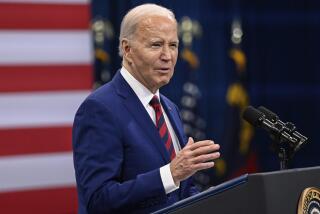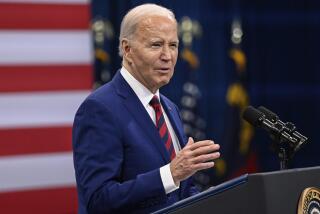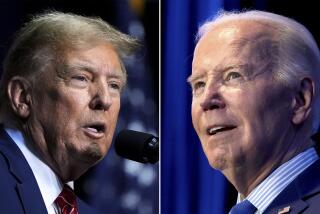Analysis:: Clinton wins by easing Democratic split; Trump wins by exploiting GOP divisions
The presidential race will go on for months, but both parties’ front-runners leaped closer Tuesday to becoming nominees. Neither Donald Trump nor Hillary Clinton won every state up for grabs, but they won most of them, and in doing so extended advantages they already had in delegates and momentum.
Trump was projected to win at least seven states; his nearest competitor, Texas Sen. Ted Cruz, won three. Trump’s swath of victories now extends from Nevada across the Deep South and up into New England.
Clinton was projected to win at least seven states, including the biggest; her challenger, Vermont Sen. Bernie Sanders, was projected to win four, one of them his home state. Clinton commands the map from Nevada through Texas and all across the South and up to Massachusetts.
Similar as their sweeping victories have been, Trump and Clinton represent diametrically opposing verdicts by each party’s voters.
Trump has harnessed and maintained support from an angry GOP electorate, cleaving a party that has rumbled with discontent for years after successive presidential losses. His sweeping victories over opposition from much of the party’s nominal leaders have been both an extension and an exaggeration of the tea party vs. establishment feuds that have colored Republican fights since 2010.
Clinton, by contrast, is well on the way toward unifying her party, regaining a firm hand after scares in Iowa and New Hampshire and effectively blunting the internal Democratic war driven by its voters’ move to the left during President Obama’s tenure. Her success is driven by the increasing diversity of her party, which allowed Latinos to push her to victory in Texas and black voters to buttress her across the South.
Formally winning the nominations is not as simple as pivoting toward the general election; the other participants are not ready to lay down their weapons.
Sanders insisted that he would fight Clinton until the party’s July convention and has the money to do so.
But he has been hamstrung by his inability to cut in any significant way into Clinton’s support among minority, women and older voters. He also has been limited by Democrats’ continued loyalty to Obama, whom Clinton has wrapped in a bear hug throughout the campaign.
Despite the increasingly liberal leanings of the party’s voters, more than 4 in 5 Democrats in Virginia’s exit polls, to take just one example, wanted the next president to continue Obama’s programs, and they went overwhelmingly for Clinton.
With Sanders unable to broaden his base, Clinton has moved to usurp his language, to the point where her typical speech echoes his. That has had the effect of stitching together the party’s liberal and moderate factions, to Clinton’s benefit.
Trump, in the meantime, has been able to exploit the grievous splits in the Republican Party. GOP leaders have tried to coalesce around Florida Sen. Marco Rubio, who was projected to win one state Tuesday. But his ascendancy would require the departure of Cruz, who had no reason to quit given his wins in his home state and Oklahoma. Ohio Gov. John Kasich has pledged not to leave pending a round of Midwestern primaries later this month.
The breadth of Trump’s wins so far — and the momentum they give him as the race moves forward — is startling. On Tuesday, he was declared the victor as the polls closed in Tennessee, Alabama, Georgia and Massachusetts, states with wildly different Republican voters. In 2012, those four states were split among three candidates.
In Virginia, a key general election state where Trump defeated Rubio, exit polls showed Trump winning handily among conservative voters and earning about a quarter of moderates. He was the favorite among Republicans who feel betrayed by their party — a sentiment that has infused his outsider campaign — but also among voters who did not feel betrayed. He won a quarter of voters who favor legal status for immigrants in the country illegally — a stance that he vehemently opposes.
See more of our top stories on Facebook >>
Clinton spent no time on Tuesday criticizing Sanders. Trump couldn’t resist snapping at Rubio, his main critic in the last two weeks, but even that sortie was limited. Instead, Clinton and Trump laid into each other about their competing visions of America. It was a preview of what the odds suggest will be a long and scorching general election ahead.
For political news and analysis, follow me on Twitter: @cathleendecker . For more on politics, go to latimes.com/decker.
MORE SUPER TUESDAY COVERAGE
Donald Trump starts adjusting to new role of GOP standard-bearer
Marco Rubio wins his first state, but his Super Tuesday struggles raise concerns
Analysis: What now for Bernie Sanders? Hillary Clinton’s South Carolina win puts him on his heels
More to Read
Get the L.A. Times Politics newsletter
Deeply reported insights into legislation, politics and policy from Sacramento, Washington and beyond. In your inbox three times per week.
You may occasionally receive promotional content from the Los Angeles Times.







